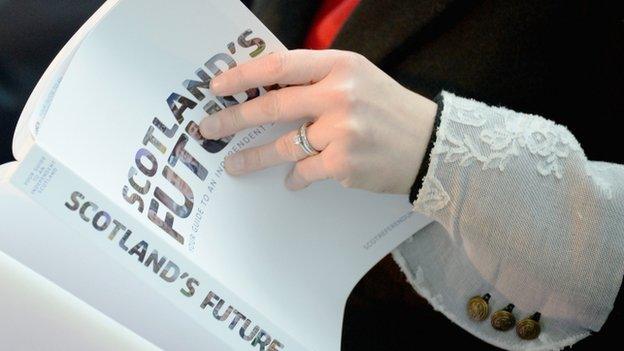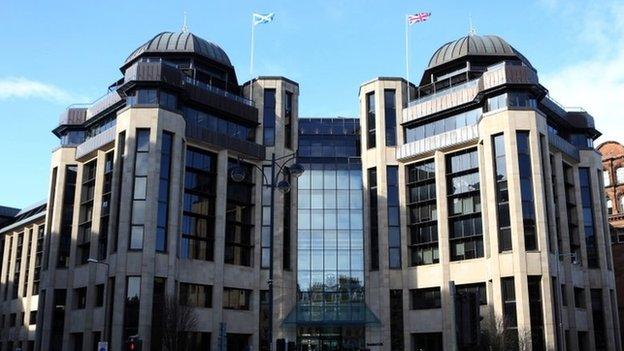Scottish independence: how competitive is the economy?
- Published

What does the White paper offer Scottish business after independence?
I've been in conversation about the implications for business of Scotland's independence options. The resulting half-hour radio programme shed rather more light than heat on the subject, so it may not get as much attention as some debates I could mention.
The debate on the Business Scotland radio programme took me back to the white paper on 'Scotland's Future', to remind myself what the offer is for independence as it affects business.
It suggests supporting investment, improved skills, access to finance, streamlining regulation and better consumer protection. What struck me is that these are either devolved powers or already policies of the UK government. So would independence involve much change?
One distinctive policy offered up in the white paper is an inbuilt competitive corporation tax rate, cutting (over time) to sit 3 pence in the pound lower than the UK rate.
That's been a moving target, as Westminster Budgets have sharply cut the UK rate to 20 pence, which not long ago was the target set by the SNP government.
Reverse tax raid
To Ian Blackford, a former investment manager representing the 'yes' side of our debate, the white paper is just a starting point for how taxation could be altered to suit Scottish circumstances.
It was understandable that Standard Life took the action it did earlier this month, he said. It's protecting its interests by creating new companies outside Scotland to which it could transfer business, if that were to become necessary.

Standard Life was said to be drawing up plans to move operations out of Scotland
The question he asked, then, is what tax regime Scotland would put in place to make Scotland a more attractive place to retain the pensions giant in Edinburgh, and to attract others in.
Ian Blackford suggested a reversal of the notorious pension raid carried out by Gordon Brown in his early days as Labour Chancellor. That, he argued, could give Scotland's asset managers a competitive advantage.
Fashion victims?
To Tessa Hartman, whose consultancy is in the fashion industry and speaking for the pro-union side, a cut in corporation tax rate misses the point of all the uncertainty and negotiation required before the Holyrood budget could get there.
She raised the prospect of cutting off Scottish designers from the opportunities they get to play on a global stage through the British Fashion Council. That would be one of those side-effects from independence that loses the advantage of "having the best of both worlds", goes the argument.
From Mure Dickie, our impartial observer, as Scotland correspondent for the Financial Times, the uncertainty extends to Britain's economic future, and much of this comes down to what choices are made after independence, rather than the 'yes' or 'no' vote itself.
He also raised the interesting question of whether small countries, for all their flexibility, can also be more vulnerable to the pressures of capture by big business interests. Ireland and Iceland might say so.
Of course, the points they made are much more nuanced than that. You can listen for yourself on iPlayer, or there's a free download.
Borrowing costs
Meanwhile, six months out from the referendum, analysis of the business and economic environment continues to pile up.
Standard & Poor's set out lots of reasons why Scotland already has economic strengths comparable to other developed nations, which it could take into an independent future. As I've noted before, it balances that with a number of concerns about the transition.
In setting out the criteria for a credit rating (while not yet setting one), the ratings agency raised concerns about the level of dependence on oil revenue and the exposure to risk from what appears to be a disproportionately large financial sector.
Citi followed up with a rather more sceptical analysis. It summarised the considerations for a credit rating thus:
"Positives: Rich, diversified and open economy, relatively high GDP/capita, some strong institutions.
"Negatives: Lack of credit history, lack of scale and market liquidity, no lender of last resort from a major central bank, high debt burden, dependency on volatile oil prices, large financial sector."
Citi suggested a premium on borrowing of 1.25 percentage points above the UK rate (currently just below 3%). That could be less if Scotland gets a deal on having the protection and joint control of the Bank of England, and higher if Scotland is perceived by the markets as having walked away from its debt responsibilities.
With Westminster's main parties saying 'no deal' and the Scottish government saying 'a deal is inevitable', Citi's assessment is that a deal is "unlikely". And it says that Scotland's credit rating would fall short of the AAA gold standard, being more "likely" to start out in the upper single-A bracket. That's below New Zealand, while above Slovenia and Chile.
"Fast-growing track"
And there's more. The Fraser of Allander Institute, at Strathclyde University, gets noticed for its forecasts, raising this year's expectation to 2.3% and the same next year.
Alongside that forecast, it publishes a commentary on the state of the economy, with learned articles.
Arguments for and against independence are included with last week's publication, written by Scottish finance minister John Swinney and Professor Jim Gallagher, adviser to the Better Together campaign.
If, like me, you like this sort of thing, they're both well worth a read, external.
This month's publication also has an interesting take on Scotland's competitiveness.
A team from the Bakbasel economic consultancy in Switzerland have offered their assessment of Scotland's current position and what it would have to address if it became independent.
Through comparison with similar nations and regions within Europe, it supports the positives in the Standard & Poor and the Citi reports, and emphasises that Scotland has significant advantages in its competitiveness.
Viewed from Basel, Scotland's had a good decade to 2012: "It's on a fast-growing track, and about to catch up with the leaders". (In this debate, that can cut either way; a sign of things going well inside the UK, or a sign of the strength on which to build outside it.)
'Mediocre prospects'
This analysis says Scotland has shown strong growth in productivity. This sounds odd, as we've been told the precise opposite about the UK economy more widely. It's a challenge that may be one of the focuses of George Osborne's Budget this week.
The catch is that the areas where Scotland has the strongest competitiveness are not in sectors that offer the best prospects for growth. Textiles, for instance: "Industries with mediocre prospects play important roles".
Business services represent a large part of Scotland's competitiveness, and that includes much of the finance sector. It can also compete in chemicals and pharmaceuticals.
The Swiss team highlights Scotland's strong university research, but points out there's a weakness in translating it into patents and commercial benefit.
Scotland has comparatively weak links to the European market, and that's inevitable because of where it is. But being close to Heathrow, it has strong links to the global market. So a priority is to keep that link into the London hub.
Scotland's economic attractiveness is "near or above the western European average in most areas. However, to attract and to hold on to foreign capital and highly qualified people, its level of attractiveness should be well above the western European average".
Top rate tax
How to get there if it were independent, ask Martin Eichler, Rebekka Rufer and Andrea Wagner? They argue Scotland should strive to retain the UK advantages of favourable regulation and flexible labour markets.
Business in Scotland benefits from the UK's political conditions, and it could potentially strengthen that further, notably by decentralising.
Holyrood could cut taxes on business profits, though there's doubt cast on whether the advantage that might give the economy would be enough to offset the loss in revenue.
The more significant tax problem being highlighted is how much the UK taxes highly-skilled people.
The SNP isn't showing any sign of wanting to cut those rates.
On the contrary, it has a lot of spending pledges. And the indications coming from the Labour Party this weekend are that Johann Lamont would like to use more taxation powers (within the UK) to make those top tax rates higher still.
To anyone watching rugby this weekend, talk of Scotland's competitiveness may touch a raw nerve.
But in economic terms, all this evidence piling up serves as a reminder that the key decisions for business are not going to be made at the referendum on 18 September, but in the decisions on taxation, spending and regulation that follow.
UPDATE 17 MARCH
On the Standard & Poor's report into Scotland's potential credit rating, much has been made of one sentence saying that Scotland would qualify for "our highest economic assessment".
This has been interpreted by some as meaning Scotland would have a AAA credit rating. It was quoted by Alex Salmond at First Minister's Questions last week.
And the convener of Holyrood's economy committee wanted to know, when questioning senior BBC journalists last week, why this particular sentence was not reported by the BBC.
So to clarify, the "economic assessment" by Standard & Poor's is one of five assessments. To quote its own guidance:
"The five factors that form the foundation of our sovereign credit analysis are:
"Institutional and governance effectiveness and security risks, reflected in the institutional and governance effectiveness score
"Economic structure and growth prospects, reflected in the economic score
"External liquidity and international investment position, reflected in the external score
"Fiscal performance and flexibility, as well as debt burden, reflected in the fiscal score
"Monetary flexibility, reflected in the monetary score."
It goes on to say that the economic assessment covers "our view of the country's income levels, growth prospects, and its economic diversity and volatility".
So the ratings agency gives high marks to Scotland for those factors. It's not saying that about the other four factors, except to say that together, they would ensure Scottish sovereign bonds would be "investment grade". That ranges from BBB- up to AAA.
Standard & Poor's hasn't said, yet, which rating it would give an independent Scotland.
It did summarise its analysis by saying Scotland's challenge would be "significant, but not unsurpassable". And that's what the BBC reported.